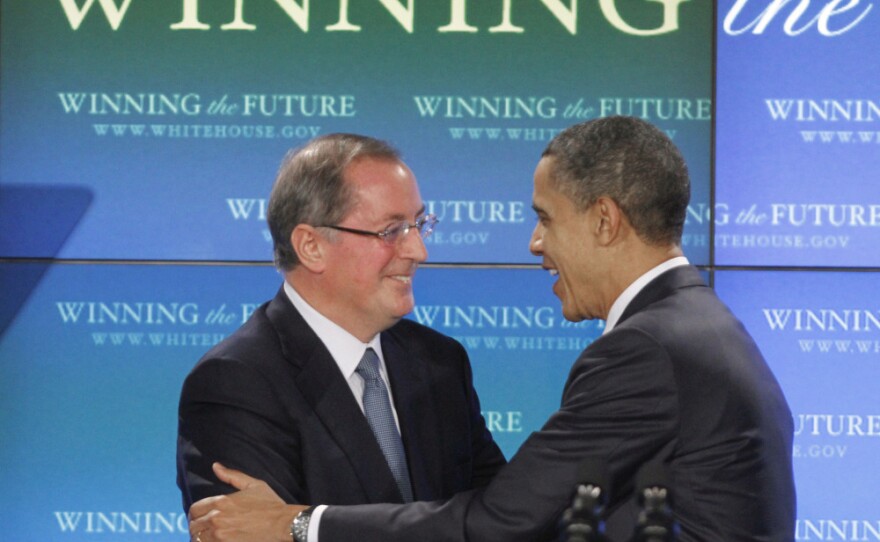How can the U.S. get people back to work?
It's a question Paul Otellini, the president and chief executive officer of Intel Corp., signed up to address when he was recently appointed to the President's Council on Jobs and Competitiveness.
The unemployment rate fell to 8.9 percent in February — the lowest it's been in nearly two years — and the private sector added more than 200,000 jobs last month, but nearly 14 million Americans remain unemployed.
In his State of the Union address this year, President Obama called on the country to "out-innovate, out-educate and outbuild the rest of the world." But is the country in the position to do that?
"An objective view would certainly show that the U.S. is at the top of the technical and innovation heap," Otellini tells NPR host Michele Norris.
But he cautions that key measures spell trouble for maintaining that lead: the number of graduates, the number of companies being formed and the number of patents inside the country versus outside of the country. "All of those things are pointed in the wrong direction today," he says. "And if they are not remedied in a way that attracts investment and attracts the right kind of human capital, we will find ourselves not at the top of the heap."
What Can The Government Do?
Beyond attracting the right kind of human capital, Otellini says, the most important thing the government can do to create jobs is to "get out of the way" by making sure that regulations for building new factories are easy to get. He also says the U.S. needs to attract more investment.
"One of the ideas that I happen to like is anyone who wants to build a new factory in this country, whether it's an American firm or a foreign firm, why don't we give them a five-year tax holiday?" he says. "It doesn't cost anything, right? You're just deferring the tax revenues that you would ordinarily get. But meanwhile you get a factory and you get jobs."
A Vast Asian Infrastructure
Otellini says one of his biggest concerns is over the vast technological infrastructure being built out across Asia.
"Every time I go to China, I come back and I tell my staff that it's like going and dipping yourself in the fountain of youth for computing because the lust for technology and the love of technology in China and in Asia in general is five times what we have here," he says.
Meanwhile, the aftershocks of the earthquake and tsunami in Japan have raised questions about the economic repercussions on the technology industry.
Otellini says Intel has no factories in Japan and that its suppliers are, so far, in "solid shape."
Education In The U.S.
Many foreign students continue to flock to graduate programs in the U.S. for math, science and engineering. Otellini says such programs remain "the envy of the world."
"Half the seats in those programs are taken up by people who do not have the right to work here the day they graduate," he says. While that fits into universities' mission to educate students of the world, it creates a problem for students who want to stay in the U.S. to work.
"They want to start companies here. They want to grow their families here. But we basically say, 'Sorry, the visa allotment is up as of May.' By the time they graduate each year, it's gone," Otellini says.
He says he favors one solution that has been floated before: "Staple a visa to everyone who gets a high-tech degree."
Copyright 2022 NPR. To see more, visit https://www.npr.org. 9(MDAzMjM2NDYzMDEyMzc1Njk5NjAxNzY3OQ001))






